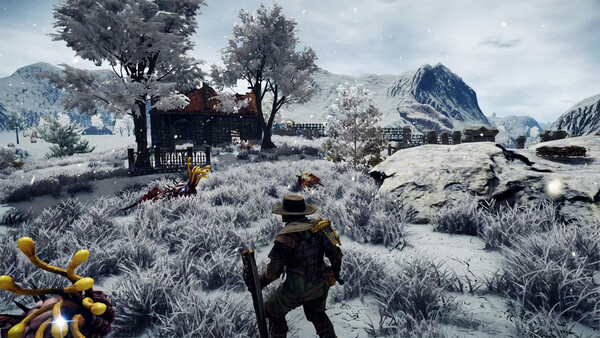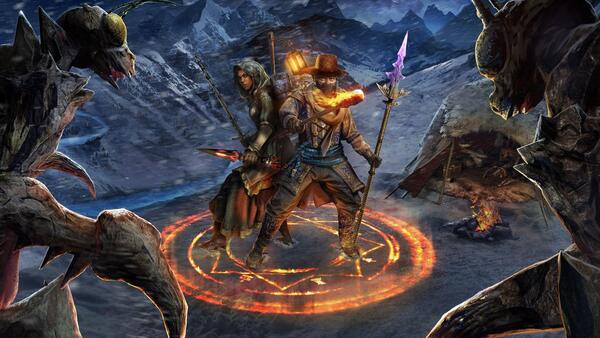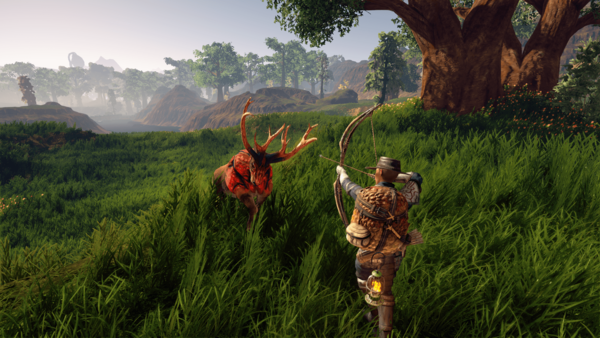Advertisement
Popular Now
Outward is a unique open-world RPG that takes players on a journey through a gritty and unforgiving landscape. Unlike many games in the genre, Outward immerses players in a survival experience that requires more than just combat skills. One of the most significant challenges players face is the intricate combat system, which emphasizes strategy, resource management, and the consequences of every decision. This article will delve deeply into the complexities of combat in Outward, exploring how to navigate its challenges effectively. We will examine various aspects, from understanding enemy behavior to mastering the use of weapons and magic, to ensure you can survive and thrive in the dangerous world of Aurai.
1. Understanding the Combat System: The Foundation of Survival
5. The Role of Environmental Awareness
10. Final Thoughts: Mastering Combat in Outward
Introduction
In Outward, combat is not just about defeating enemies; it’s about survival. The game’s unique mechanics force players to consider their actions carefully. You can't just charge into battle; you need to manage your stamina, health, and resources while understanding the strengths and weaknesses of your enemies. With its unforgiving nature, Outward challenges you to think critically about combat and survival. In this article, we will dissect the combat mechanics in Outward and provide in-depth strategies and insights to help you navigate these challenges effectively.1. Understanding the Combat System: The Foundation of Survival
The Basics of Combat
Combat in Outward is grounded in a few core mechanics that every player must master. Understanding these mechanics is essential for survival in the game’s challenging environments.Stamina Management
Your character has a stamina bar that depletes with each action, including attacking, dodging, and blocking. Effective stamina management is crucial because running out of stamina leaves you vulnerable to attacks.- Stamina Drain: Different actions consume varying amounts of stamina. For instance, heavy attacks drain more stamina than light attacks. Players must balance their offensive moves with defensive strategies.
- Regeneration: Stamina regenerates over time, but certain actions can prevent regeneration. If you are hit while low on stamina, you will not recover quickly, making it essential to gauge when to attack and when to retreat.
Health and Status Effects
Health is another critical factor in Outward. Unlike many RPGs, health does not regenerate over time, which means you need to rely on potions, bandages, and sleep to recover.- Health Management: Always carry healing items, as injuries can occur suddenly during combat. It's advisable to keep a few bandages and health potions on hand before engaging in battles.
- Status Effects: Enemies can inflict various status effects, such as bleeding, poison, or corruption. Being aware of these effects and how to counter them is essential.
Combat Roles: Tailoring Your Approach
Combat in Outward also involves understanding your role within it. Players can choose different approaches based on their playstyle.- Tank Role: Using heavy armor and shields allows players to absorb damage and protect allies. This role is vital in multiplayer settings, where one player can draw enemy attention while others attack.
- DPS Role: Focus on high damage output using light armor and fast weapons. This role requires agility and timing, as players must dodge attacks while dealing damage.
2. Enemy Types: Learning Their Patterns
Understanding Different Enemies
In Outward, you will encounter various enemies, each with distinct behaviors and attack patterns. Familiarizing yourself with these enemies is crucial for survival.Common Enemy Types
- Bandits: Typically human foes that use a variety of weapons. They often attack in groups and are aggressive.
- Creatures: From wolves to giant bears, these beasts are fierce and can deal significant damage if not approached carefully.
- Undead: These foes often have unique attacks and resistances, making them tricky to defeat.
Analyzing Attack Patterns
Every enemy type has its attack patterns. Learning these can give you the upper hand in combat.- Reading Movements: Pay attention to your enemies' movements before they attack. Most foes have a wind-up animation that indicates their next move.
- Counterattacking: Once you understand an enemy's pattern, you can exploit openings to counterattack effectively.
3. Weapon Mastery: Choosing the Right Tools
Types of Weapons
In Outward, the type of weapon you choose can significantly impact your combat effectiveness. Each weapon has unique strengths, weaknesses, and attack styles.Melee Weapons
- Swords: Balanced and versatile, swords allow for quick strikes and decent defense. They are suitable for players who want a mix of offense and defense.
- Great Hammers: Slow but powerful, these weapons deal massive damage. They require careful timing but can be devastating if used correctly.
Ranged Weapons
- Bows: Excellent for maintaining distance, bows allow players to engage enemies from afar. However, they require ammunition management and can be less effective in close quarters.
- Magic: Casting spells requires mana, which is replenished through various means. Magic can deal substantial damage and provide utility, such as healing or barriers.
Weapon Stats and Upgrades
Understanding weapon stats and how to upgrade them is essential. Each weapon has unique stats, such as damage, speed, and critical hit chance.- Upgrading Weapons: Utilize crafting and resource gathering to improve your weapons. For instance, adding materials can enhance durability or damage output.
- Matching Weapons to Enemies: Certain enemies are weak to specific weapon types. Adapting your weapon choice based on your enemies can make battles easier.
4. The Art of Dodging and Blocking
Mastering Defensive Mechanics
Combat is not just about offense; defense is equally important. Mastering dodging and blocking can significantly increase your chances of survival.Dodging Techniques
Dodging is essential to avoid enemy attacks and conserve stamina. Timing your dodges perfectly can create openings for counterattacks.- Directional Dodging: Learn to dodge in the direction opposite to the incoming attack. This will minimize damage and position you for a counter.
- Stamina Conservation: Each dodge consumes stamina, so it's vital to gauge when to dodge and when to hold back. Overdodging can leave you vulnerable.
Blocking and Counterattacking
Blocking is another critical defensive mechanic.- Using Shields: Shields can deflect attacks and reduce damage taken. However, blocking also drains stamina, so be mindful of how long you hold your block.
- Counterattacks: After successfully blocking an enemy attack, you often have an opening for a counterattack. Timing is crucial; attack immediately after blocking to exploit this opportunity.
5. The Role of Environmental Awareness
Using the Environment to Your Advantage
The world of Outward is filled with environmental elements that can aid or hinder your combat experience. Being aware of your surroundings can provide significant advantages.Terrain and Obstacles
Navigating the battlefield effectively is crucial. Use terrain to your advantage by positioning yourself strategically.- High Ground: Gaining elevation can provide a tactical advantage, especially with ranged attacks.
- Obstacles: Use trees, rocks, and other environmental features to block enemy line of sight or create distance between you and your foes.
Environmental Hazards
Some areas have environmental hazards that can be used against enemies.- Traps: Certain regions contain traps that can deal damage to enemies. Lure foes into these traps to gain an upper hand.
- Weather Conditions: Extreme weather can impact combat, affecting visibility and mobility. Adapt your strategy based on the current conditions.
6. The Importance of Resource Management
Gathering and Managing Supplies
In Outward, resources are essential for survival. From healing items to crafting materials, managing your inventory is vital for success in combat.Healing Items
Always carry a variety of healing items, as health does not regenerate automatically.- Health Potions: Useful for quick healing during or after combat.
- Bandages: Essential for healing wounds, especially after intense battles.
Crafting and Upgrading Supplies
Crafting and upgrading your equipment can provide significant advantages in combat.- Collecting Resources: Gather materials from the environment, including herbs for potions and ores for weapon upgrades.
- Upgrading Gear: Focus on enhancing your armor and weapons to increase your survivability in combat.
7. Multiplayer Dynamics: Cooperation and Strategy
The Benefits of Co-op Play
Outward offers a cooperative multiplayer experience, which can drastically alter your approach to combat.Sharing Responsibilities
In multiplayer, players can divide responsibilities based on their strengths.- Tank vs. DPS: One player can focus on absorbing damage while the other deals damage from a distance, creating a balanced team.
- Resource Sharing: Players can share healing items, mana potions, and other resources, making it easier to survive challenging encounters.
Communication and Strategy
Effective communication is crucial in multiplayer settings.- Callouts: Use callouts to inform your partner about enemy positions or health status.
- Coordinated Attacks: Plan your attacks based on your team composition. For instance, if one player distracts an enemy, the other can strike from behind.
8. Dealing with Status Effects: Managing Debuffs
Understanding Status Effects
In Outward, various enemies can inflict status effects that hinder your performance in combat.Common Status Effects
- Bleeding: Causes health to drain over time. Use bandages to stop the bleeding.
- Poison: Gradually reduces health. Antidotes are necessary to counteract this effect.
Countering Status Effects
Managing these effects is crucial for survival.- Status Cures: Always carry items that can cure status effects. For example, antidotes for poison and bandages for bleeding.
- Preparation: Before entering combat, consider equipping gear that offers resistance to specific status effects.
9. Learning from Defeat: Embracing Failure
The Importance of Death in Outward
In Outward, death is an integral part of the experience. Learning from defeats can help players improve their combat skills.Analyzing Mistakes
Each defeat provides an opportunity to analyze what went wrong.- Reviewing Combat Decisions: After dying, reflect on your decisions. Did you manage your stamina well? Did you rush into combat without a strategy?
- Adjusting Strategies: Use what you learned from each defeat to adjust your tactics in future encounters.
Embracing the Challenge
The challenging nature of Outward is part of its charm. Embracing the challenge can enhance your gaming experience.- Finding Joy in Difficulty: Recognize that the struggle makes victory more rewarding. Each successful encounter will feel like an achievement.
- Engaging with the Community: Sharing your experiences with other players can provide new strategies and insights, enhancing your understanding of the game.
10. Final Thoughts: Mastering Combat in Outward
Continuous Learning
Combat in Outward is a deep and intricate system that requires continuous learning and adaptation. Each battle presents a unique challenge that demands your attention and skill.- Practice Makes Perfect: Don’t hesitate to spend time practicing combat techniques. The more you engage with the system, the more natural it will become.
- Exploring New Strategies: Experiment with different weapon types, combat styles, and team compositions to find what works best for you.



















